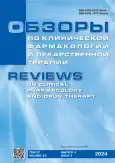Assessing the influence of the angiotensinogen gene’s polymorphic marker M235T on the changes in daily blood pressure monitoring indicators in patients with stage I–II hypertension
- Authors: Rebrova E.V.1, Shikh E.V.1
-
Affiliations:
- I.M. Sechenov First Moscow State Medical University (Sechenov University)
- Issue: Vol 22, No 4 (2024)
- Pages: 389-397
- Section: Original study articles
- URL: https://journal-vniispk.ru/RCF/article/view/283522
- DOI: https://doi.org/10.17816/RCF634263
- ID: 283522
Cite item
Abstract
BACKGROUND: The effectiveness of antihypertensive therapy may be associated with genetic factors that both influence the degree of increase in blood pressure and determine inter-subject variability of response to antihypertensive treatment.
AIM: To study pharmacodynamic parameters of the effectiveness of therapy with angiotensin II receptor blockers as monotherapy and as part of combination drugs in patients with hypertension, depending on the genetic characteristics of patients, specifically the M235T polymorphism of the angiotensinogen gene.
MATERIALS AND METHODS: The study involved 179 patients from the Moscow region with newly diagnosed stage I–II hypertension, including 141 (78.8%) women and 38 (21.2%) men aged 32 to 69 years, who were randomly assigned to groups receiving irbesartan and valsartan as monotherapy or in combination therapy with hydrochlorothiazide, using a simple randomization method. Genetic polymorphism rs699 (C4072T, M235T) of the AGT angiotensinogen gene was determined after 3 weeks of drug therapy.
RESULTS: After three months of drug therapy, the maximum antihypertensive effect in the group of patients receiving valsartan was observed in CC homozygotes and heterozygotes by the level of decrease in mean daytime systolic blood pressure. In CC homozygotes, a trend was outlined by the level of decrease in mean daytime diastolic blood pressure; in CC homozygotes, by the level of decrease in mean nighttime systolic blood pressure; in CC and TT homozygotes, by the level of decrease in mean nighttime diastolic blood pressure. No statistically significant association of the angiotensinogen gene’s M235T polymorphism genotype with these parameters was found among patients receiving irbesartan.
CONCLUSIONS: The obtained data may indicate a more rapid and stable antihypertensive effect in patients carrying the C allele of the M235T genetic polymorphism of the angiotensinogen gene. Therefore, personalized therapy of arterial hypertension using the detection of the M235T genetic polymorphism in the AGT gene may reasonably include the AT1-receptor blocker valsartan as a starting therapy for the C allele carriers in the Moscow region, as monotherapy or two-component therapy, depending on the stage of hypertension.
Keywords
Full Text
##article.viewOnOriginalSite##About the authors
Ekaterina V. Rebrova
I.M. Sechenov First Moscow State Medical University (Sechenov University)
Author for correspondence.
Email: katrina1987@rambler.ru
ORCID iD: 0000-0002-4374-9754
SPIN-code: 9445-5564
Cand. Sci. (Medicine), Assistant Professor
Russian Federation, 8 building 2 Trubetskaya st., Moscow, 119991Eugeniya V. Shikh
I.M. Sechenov First Moscow State Medical University (Sechenov University)
Email: chih@mail.ru
ORCID iD: 0000-0001-6589-7654
SPIN-code: 2397-8414
Dr. Med. Sci., Professor
Russian Federation, 8 building 2 Trubetskaya st., Moscow, 119991References
- Rysz J, Franczyk B, Rysz-Górzyńska M, Gluba-Brzózka A. Pharmacogenomics of hypertension treatment. Int J Mol Sci. 2020;21(13):4709. doi: 10.3390/ijms21134709
- Olczak KJ, Taylor-Bateman V, Nicholls HL, et al. Hypertension genetics past, present and future applications. J Intern Med. 2021;290(6):1130–1152. doi: 10.1111/joim.13352
- Tang SWY, Mai AS, Chew NWS, et al. The clinical impact of anti-hypertensive treatment drug-gene pairs in the Asian population: a systematic review of publications in the past decade. J Hum Hypertens. 2023;37(3):170–180. doi: 10.1038/s41371-022-00765-y
- Loganathan L, Gopinath K, Sankaranarayanan VM, et al. Computational and pharmacogenomic insights on hypertension treatment: rational drug design and optimization strategies. Curr Drug Targets. 2020;21(1):18–33. doi: 10.2174/1389450120666190808101356
- Padmanabhan S, Dominiczak AF. Genomics of hypertension: the road to precision medicine. Nat Rev Cardiol. 2021;18(4):235–250. doi: 10.1038/s41569-020-00466-4
- Al Ghorani H, Götzinger F, Böhm M, Mahfoud F. Arterial hypertension — Clinical trials update 2021. Nutr Metab Cardiovasc Dis. 2022;32(1):21–31. doi: 10.1016/j.numecd.2021.09.007
- Ott C, Schmieder RE. Diagnosis and treatment of arterial hypertension 2021. Kidney Int. 2022;101(1):36–46. doi: 10.1016/j.kint.2021.09.026
- Levitsky SN, Pervukhina OA, Bebyakova NA Role of polymorphisms of genes of the renin-angiotensin system in the formation of cardiovascular pathology. Journal of Biomedical Research. 2016;(4):30–39. EDN: WYBVJR doi: 10.17238/issn2308-3174.2016.4.30
- Rebrova EV, Shikh EV. Influence of genetic polymorphism of genes encoding target of action on the efficacy of antihypertensive therapy. Clinical Pharmacologic Therapy. 2024;33(1):59–66. EDN: YUAOOS doi: 10.32756/0869-5490-2024-1-59-66
- Mulerova TA, Morozova NI, Maksimov VN, et al. Polymorphism of genes-candidates of renin-angiotensin-aldosteronovy system (ACE, AGT, AGTR1) and effectiveness of treatment of arterial hypertension. Results of research in mountain shoria. Systemic Hypertension. 2020;17(4):49–54. EDN: PMYOGM doi: 10.26442/2075082X.2020.4.2000
- Li H, Du Z, Zhang L, et al. The relationship between angiotensinogen gene polymorphisms and essential hypertension in a Northern Han Chinese population. Angiology. 2014;65(7):614–619. doi: 10.1177/0003319713491309
- Cao YH, Li X, Liu MH, et al. Association of RAAS gene polymorphisms with susceptibility to essential hypertension in military secret service personnel. Zhonghua Lao Dong Wei Sheng Zhi Ye Bing Za Zhi. 2022;40(7):504–508. doi: 10.3760/cma.j.cn121094-20210202-00072
- Kurland L, Liljedahl U, Karlsson J, et al. Angiotensinogen gene polymorphisms: relationship to blood pressure response to antihypertensive treatment. Results from the Swedish Irbesartan Left Ventricular Hypertrophy Investigation vs Atenolol (SILVHIA) trial. Am J Hypertens. 2004;17(1):8–13. doi: 10.1016/j.amjhyper.2003.09.009
- Schelleman H, Klungel OH, Witteman JC, et al. Angiotensinogen M235T polymorphism and the risk of myocardial infarction and stroke among hypertensive patients on ACE-inhibitors or beta-blockers. Eur J Hum Genet. 2007;15(4):478–484. doi: 10.1038/sj.ejhg.5201789
- Goldenberg I, Moss AJ, Ryan D, et al. Polymorphism in the angiotensinogen gene, hypertension, and ethnic differences in the risk of recurrent coronary events. Hypertension. 2006;48(4):693–699. doi: 10.1161/01.HYP.0000239204.41079.6b





